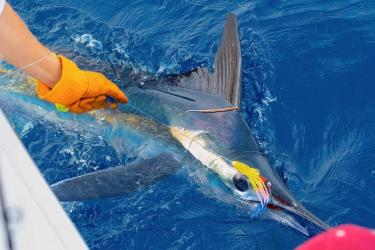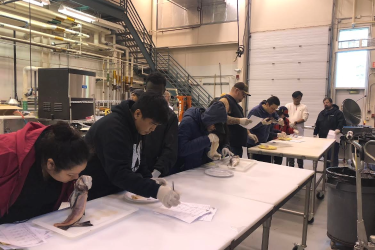KEY MESSAGE:
- NOAA Fisheries announces implementation of a program to allow the Gulf of Mexico (Gulf) states (Louisiana, Mississippi, Alabama, Florida, and Texas) some management authority for recreational fishing of red snapper by private anglers in federal waters of the Gulf.
WHEN RULE WILL TAKE EFFECT:
- Regulations will be effective February 6, 2020
SUMMARY OF CHANGES:
- Each Gulf state has limited authority to manage red snapper recreational private angling in state and federal waters off each state. Each state must:
- Set the fishing season
- Specify a bag limit
- Specify a minimum size limit (between 14 and 18 inches total length)
- Each Gulf state has the option to establish a maximum size limit.
- Florida, Alabama, and Texas may request closure of areas of federal waters adjacent to state waters.
- The red snapper private angling quota will be allocated among the states as follows:
|
State |
Louisiana |
Mississippi |
Alabama |
Florida |
Texas |
|
Percentage of Total Private Angling Quota |
19.120 |
3.550 |
26.298 |
44.822 |
6.210 |
|
Amount of 2020 Quota (pounds)* |
816,233 |
151,550 |
1,122,662 |
1,913,451 |
265,105 |
*The amounts assume no state exceeds their 2019 annual catch limit.
- If the landings of a state exceed that state’s quota, then in the following year that state’s quota will be reduced by the amount of the overage in the prior fishing year.
FREQUENTLY ASKED QUESTIONS (FAQs)
Why is NOAA Fisheries delegating management to the Gulf states?
- Recreational fishermen throughout the Gulf requested more flexibility in recreational red snapper management to provide greater socioeconomic benefits to their local area.
- State management is expected to increase fishing opportunities and economic benefits by allowing each Gulf state to establish specific management measures for the private recreational harvest of red snapper in federal waters by anglers landing in that state.
What was the basis for the state-specific quotas?
- The quota allocation is based on the allocations requested by each state in its 2018 – 2019 exempted fishing permit application, which totaled 96.22%.
- Because Florida and Alabama had the shortest seasons under the EFPs, the Gulf of Mexico Fishery Management Council (Council) agreed to apportion the remaining 3.78% between Florida and Alabama.
What is the post-season quota adjustment?
- Currently if red snapper is classified as overfished (population too low) and there is an overage of the recreational quota, NOAA Fisheries will reduce the recreational quota in the following year by the amount of the overage.
- This final rule adds a payback adjustment for each state. If the landings of a state exceed that state’s quota, then in the following year that state’s quota will be reduced by the amount of the overage in the prior fishing year, even if the stock is not overfished.
How can a state request closure of areas of federal waters adjacent to state waters?
- The state can request the closure by letter, providing dates and geographic coordinates for the closure.
- If the request is within the scope of the analysis in the amendment that established the program (Reef Fish Amendment 50), NOAA Fisheries will publish a notice in the Federal Register implementing the closure as requested.
- Texas can request closure of all federal waters off Texas when a portion of the Texas quota has been landed.
- Florida can request a closure of federal waters adjacent to Florida seaward of an approximation of the 20-fathom depth contour or 35-fathom depth contour.
- Alabama can request a closure of federal waters adjacent to Alabama seaward of an approximation of the 20-fathom depth contour or 35-fathom depth contour.
- Neither Louisiana nor Mississippi provided a potential closure to analyze.
- Closures requested by individual states and implemented by NOAA will apply to all private anglers regardless of which state the angler plans to land the fish.
How will NOAA Fisheries ensure the states are managing red snapper appropriately?
- Management measures under a state’s state management program must achieve the same conservation goals as the current federal management measures (for example, constrain harvest to the state’s allocated quota).
- The Council will still determine the total recreational sector, component, and state quotas.
- If at any time NOAA Fisheries determines a state’s delegation is inconsistent with the Fishery Management Plan for the Reef Fish Fishery of the Gulf of Mexico, the delegation could be suspended.
How will red snapper regulations on the private angling component in Gulf federal waters be enforced?
- Private recreational anglers in the Gulf need a saltwater recreational fishing license or registration from the state in which they intend to land. Visit the National Saltwater Angler Registry to ensure you are registered.
- A private angler must be in compliance with the fishing license (permit) requirements of the state in which they intend to land the fish.
- In federal waters, enforcement agents would use the least restrictive state management measures in place at the time, to determine compliance.
- For example, if Mississippi implements a two-fish bag limit while the other states implement a one-fish bag limit, a private angler in possession of three fish in federal waters would not be in compliance with any state.
- A private angler with two fish in federal waters would be in compliance if they also had the appropriate Mississippi state license, because they could land in Mississippi.
How will the federal for-hire component of the Gulf red snapper fishery be managed?
- For-hire vessels with federal charter/headboat permits will continue to be managed under federal regulations.
- Those regulations include a fishing season that begins June 1 and continues until the component quota is projected to be met, a two-fish bag limit, and a 16-inch minimum size limit.
Where can I find more information on the state management program?
- Amendments 50A-F, which established the program, may be found online at the NOAA Fisheries Southeast Regional Office Web site.
- A public hearing video about the amendment can be found on the Council Web site.
- Contact NOAA Fisheries, Southeast Regional Office:
By Mail: Lauren Waters
NOAA Fisheries, Southeast Regional Office
Sustainable Fisheries Division
263 13th Avenue South
St. Petersburg, Florida 33701-5505
By Phone: (727) 824-5305
SIGN UP FOR TEXT MESSAGE ALERTS - FIND OUT ABOUT IMMEDIATE OPENINGS AND CLOSURES
NOAA's Text Message Alert Program allows you to receive important fishery related alerts via text message (SMS). Standard message & data rates may apply. You may opt-out at any time.
Text alerts you may receive include:
- Immediate fishery openings and closures
- Any significant changes to fishing regulations that happen quickly
Sign up for one or more of the following groups:
- Gulf of Mexico Recreational Fisheries Related Alerts
- Text GULFRECFISH to 888777
- Gulf of Mexico Commercial Fisheries Related Alerts
- Text GULFCOMMFISH to 888777
- South Atlantic Recreational Fisheries Related Alerts
- Text SATLRECFISH to 888777
- South Atlantic Commercial Fisheries Related Alerts
- Text SATLCOMMFISH to 888777
- Caribbean Fisheries Related Alerts
- Text CARIBFISH to 888777
![]() Join us every other Friday on NOAA Fish Instagram for Rec Fish Friday!
Join us every other Friday on NOAA Fish Instagram for Rec Fish Friday!
Other contacts:
Media: Kim Amendola, 727-551-5707
Allison Garrett, 727-551-5750

